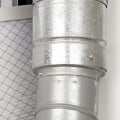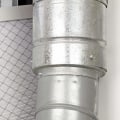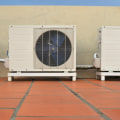Generally speaking, anything under a MERV 13 air filter should provide very efficient air purification in a house without affecting airflow. Meanwhile, air filters with a MERV 14 rating or higher are designed for commercial HVAC systems that can handle the coarsest filter material. Although the American Society of Heating, Refrigeration and Air Conditioning Engineers (ASHRAE) suggests MERV 13, it may not be the most efficient option for some residential HVAC systems. In fact, MERV 11 may even be too restrictive.
It is best to adhere to the oven manufacturer's recommendations or consult an HVAC professional to determine exactly which MERV rating is best for your specific system. If your furnace's MERV rating is too high, it may force it to work too hard and leave it vulnerable to damage. In addition, you may not get the air velocity needed to reach all parts of your house, leaving inconsistencies in temperature. The goal of using a MERV 12 or higher filter is a better IAQ: cleaner, more breathable air for everyone, and especially for those with allergies, asthma, COPD, etc. If you are in a situation where you should not use a high MERV (12+) filter for your oven or air conditioner and would like to research air purifiers air, here are two suggestions.
There are many considerations for choosing the best air filter. While a filter with a higher MERV rating might provide better filtration, it's important to recognize that a MERV that is too high could cost you more in terms of your heating and air conditioning system. The higher the MERV, the more restrictive the airflow through the device, which will make the equipment work harder. Your intention should be to achieve the right balance between air filtration levels, air flow and energy efficiency. Typically, a filter with a higher MERV rating will reduce airflow.
However, there are many other factors at play, such as the size of the filter and the type of fan motor of the HVAC system. Second, ASHRAE is now encouraging the switch to MERV-13 (ASHRAE Position Paper on Infectious Aerosols) as a measure to provide cleaner air in non-sanitary facilities. They also have an external housing for a MERV 14 filter, I wish I had installed it too. It turns out that sometimes, due to the unintended consequences of high MERV filters, the cure is worse than the problem. I want to introduce a carbon filter I want to introduce a carbon filter, the only problem is that the carbon filter is a Merv 8.If you want your air to at least be cleaned and handle dust, mold, pollen and bacteria, then a MERV 8 will do the job. Home Energy published an article by Dave Springer of Davis Energy Group at the time, on the pressure drop and energy use of various MERV filters.
Finally, I say that there is no price for peace of mind and that if they feel that a high merv filter would provide that they should do so with the warning that they should replace dirty filters often enough &, it may be a week or two, depending on the MERV rating, effective filter area and the amount of particles that enter your home. With the lowest MERV rating (1-), the filter will continue to capture pollen, dust mites, cockroach debris, sanding dust, spray paint dust, textile fibers and carpet fibers. In fact, even filters with high MERV ratings can be used in some systems with minimal pressure drop. Yes, I'm looking for the same thing Yes, I'm looking for the same answer about using a merv13 pleated air conditioning filter as part of a mask.
The pressure drop lies in achieving the highest possible pleat per foot, and modern designs have far fewer airflow problems at higher MERV levels. While ASHRAE recommends MERV 13 and 14, it is best to select a filter with the highest possible MERV rating for your specific HVAC system. Choosing an appropriate MERV rating for your home can be tricky but it doesn't have to be overwhelming. It's important to understand how different ratings affect airflow and energy efficiency so you can make an informed decision about what's best for your home.
Generally speaking anything under MERV 13 should provide efficient air purification without affecting airflow too much. However if you have allergies or other respiratory issues then you may want to consider going up to MERV 14. It's also important to consider other factors such as size of filter and type of fan motor when selecting an appropriate rating for your HVAC system. Additionally if you're looking for additional protection from airborne particles then you may want to consider adding an external housing for a MERV 14 filter or introducing a carbon filter with MERV 8.
Ultimately selecting an appropriate MERV rating will help ensure cleaner air in your home while also maintaining energy efficiency.






